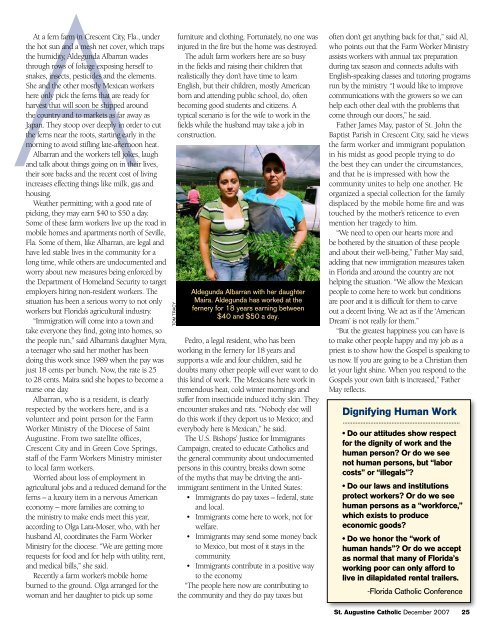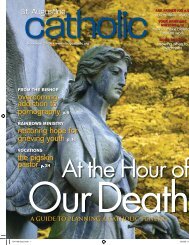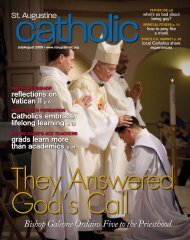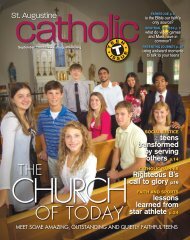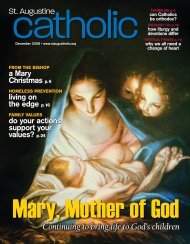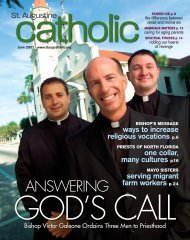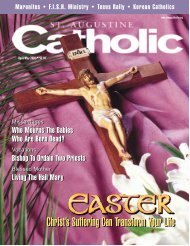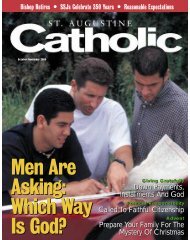December - St. Augustine Catholic
December - St. Augustine Catholic
December - St. Augustine Catholic
You also want an ePaper? Increase the reach of your titles
YUMPU automatically turns print PDFs into web optimized ePapers that Google loves.
aAt a fern farm in Crescent City, Fla., under<br />
the hot sun and a mesh net cover, which traps<br />
the humidity, Aldegunda Albarran wades<br />
through rows of foliage exposing herself to<br />
snakes, insects, pesticides and the elements.<br />
She and the other mostly Mexican workers<br />
here only pick the ferns that are ready for<br />
harvest that will soon be shipped around<br />
the country and to markets as far away as<br />
Japan. They stoop over deeply in order to cut<br />
the ferns near the roots, starting early in the<br />
morning to avoid stifling late-afternoon heat.<br />
Albarran and the workers tell jokes, laugh<br />
and talk about things going on in their lives,<br />
their sore backs and the recent cost of living<br />
increases effecting things like milk, gas and<br />
housing.<br />
Weather permitting; with a good rate of<br />
picking, they may earn $40 to $50 a day.<br />
Some of these farm workers live up the road in<br />
mobile homes and apartments north of Seville,<br />
Fla. Some of them, like Albarran, are legal and<br />
have led stable lives in the community for a<br />
long time, while others are undocumented and<br />
worry about new measures being enforced by<br />
the Department of Homeland Security to target<br />
employers hiring non-resident workers. The<br />
situation has been a serious worry to not only<br />
workers but Florida’s agricultural industry.<br />
“Immigration will come into a town and<br />
take everyone they find, going into homes, so<br />
the people run,” said Albarran’s daughter Myra,<br />
a teenager who said her mother has been<br />
doing this work since 1989 when the pay was<br />
just 18 cents per bunch. Now, the rate is 25<br />
to 28 cents. Maira said she hopes to become a<br />
nurse one day.<br />
Albarran, who is a resident, is clearly<br />
respected by the workers here, and is a<br />
volunteer and point person for the Farm<br />
Worker Ministry of the Diocese of Saint<br />
<strong>Augustine</strong>. From two satellite offices,<br />
Crescent City and in Green Cove Springs,<br />
staff of the Farm Workers Ministry minister<br />
to local farm workers.<br />
Worried about loss of employment in<br />
agricultural jobs and a reduced demand for the<br />
ferns – a luxury item in a nervous American<br />
economy – more families are coming to<br />
the ministry to make ends meet this year,<br />
according to Olga Lara-Moser, who, with her<br />
husband Al, coordinates the Farm Worker<br />
Ministry for the diocese. “We are getting more<br />
requests for food and for help with utility, rent,<br />
and medical bills,” she said.<br />
Recently a farm worker’s mobile home<br />
burned to the ground. Olga arranged for the<br />
woman and her daughter to pick up some<br />
Tom Tracy<br />
furniture and clothing. Fortunately, no one was<br />
injured in the fire but the home was destroyed.<br />
The adult farm workers here are so busy<br />
in the fields and raising their children that<br />
realistically they don’t have time to learn<br />
English, but their children, mostly American<br />
born and attending public school, do, often<br />
becoming good students and citizens. A<br />
typical scenario is for the wife to work in the<br />
fields while the husband may take a job in<br />
construction.<br />
Aldegunda Albarran with her daughter<br />
Maira. Aldegunda has worked at the<br />
fernery for 18 years earning between<br />
$40 and $50 a day.<br />
Pedro, a legal resident, who has been<br />
working in the fernery for 18 years and<br />
supports a wife and four children, said he<br />
doubts many other people will ever want to do<br />
this kind of work. The Mexicans here work in<br />
tremendous heat, cold winter mornings and<br />
suffer from insecticide induced itchy skin. They<br />
encounter snakes and rats. “Nobody else will<br />
do this work if they deport us to Mexico; and<br />
everybody here is Mexican,” he said.<br />
The U.S. Bishops’ Justice for Immigrants<br />
Campaign, created to educate <strong>Catholic</strong>s and<br />
the general community about undocumented<br />
persons in this country, breaks down some<br />
of the myths that may be driving the antiimmigrant<br />
sentiment in the United <strong>St</strong>ates:<br />
• Immigrants do pay taxes – federal, state<br />
and local.<br />
• Immigrants come here to work, not for<br />
welfare.<br />
• Immigrants may send some money back<br />
to Mexico, but most of it stays in the<br />
community.<br />
• Immigrants contribute in a positive way<br />
to the economy.<br />
“The people here now are contributing to<br />
the community and they do pay taxes but<br />
often don’t get anything back for that,” said Al,<br />
who points out that the Farm Worker Ministry<br />
assists workers with annual tax preparation<br />
during tax season and connects adults with<br />
English-speaking classes and tutoring programs<br />
run by the ministry. “I would like to improve<br />
communications with the growers so we can<br />
help each other deal with the problems that<br />
come through our doors,” he said.<br />
Father James May, pastor of <strong>St</strong>. John the<br />
Baptist Parish in Crescent City, said he views<br />
the farm worker and immigrant population<br />
in his midst as good people trying to do<br />
the best they can under the circumstances,<br />
and that he is impressed with how the<br />
community unites to help one another. He<br />
organized a special collection for the family<br />
displaced by the mobile home fire and was<br />
touched by the mother’s reticence to even<br />
mention her tragedy to him.<br />
“We need to open our hearts more and<br />
be bothered by the situation of these people<br />
and about their well-being,” Father May said,<br />
adding that new immigration measures taken<br />
in Florida and around the country are not<br />
helping the situation. “We allow the Mexican<br />
people to come here to work but conditions<br />
are poor and it is difficult for them to carve<br />
out a decent living. We act as if the ‘American<br />
Dream’ is not really for them.”<br />
“But the greatest happiness you can have is<br />
to make other people happy and my job as a<br />
priest is to show how the Gospel is speaking to<br />
us now. If you are going to be a Christian then<br />
let your light shine. When you respond to the<br />
Gospels your own faith is increased,” Father<br />
May reflects.<br />
Dignifying Human Work<br />
• Do our attitudes show respect<br />
for the dignity of work and the<br />
human person? Or do we see<br />
not human persons, but “labor<br />
costs” or “illegals”?<br />
• Do our laws and institutions<br />
protect workers? Or do we see<br />
human persons as a “workforce,”<br />
which exists to produce<br />
economic goods?<br />
• Do we honor the “work of<br />
human hands”? Or do we accept<br />
as normal that many of Florida’s<br />
working poor can only afford to<br />
live in dilapidated rental trailers.<br />
-Florida <strong>Catholic</strong> Conference<br />
<strong>St</strong>. <strong>Augustine</strong> <strong>Catholic</strong> <strong>December</strong> 2007 25


